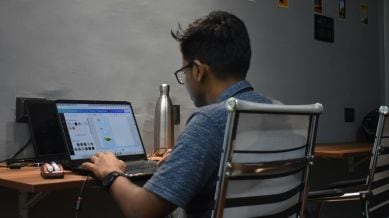78% of Gen Z professionals in India want to explore AI more at work, study finds
A majority of Gen Z professionals and their managers also acknowledged using unapproved AI tools to complete their creative work, as per the report.

Gen Z professionals in India want more room to experiment with AI tools even as enterprise adoption of artificial intelligence worldwide remains in its early stages.
Over 78 per cent of Gen Z workers said that experimenting with AI tools could help improve their visual workflows, according to a new report by Canva on Tuesday, September 9.
monthly limit of free stories.
with an Express account.
The findings of the report titled ‘State of Visual Communication Report’ show that there is a significant disconnect between how Gen Z employees in India want to work and how most companies still operate, the creative design software company said.
A total of 2,475 business leaders and Gen Z professionals across the United States, the United Kingdom, Australia, Japan, India, France, Germany and Spain, were surveyed by Canva as part of the research report that was drafted in partnership with The Harris Poll and Neuro-Insight.
90 per cent of the survey respondents said that barriers such as unhelpful AI tools hindered their creativity at work. However, a majority of Gen Z professionals (91 per cent) and their managers (84 per cent) also acknowledged using unapproved AI tools to complete their creative work. On average, teams now juggle between 11 and 12 platforms per week just to execute visual projects, Canva said, adding that only 22 per cent of organisations globally describe themselves as “design-led”.
The findings of the survey report come at a time when workplaces worldwide, including India, grapple with rising inefficiencies due to clashes between visual and traditional approaches. These issues have been exacerbated by the emergence of generative AI. There is also an ongoing debate over who is responsible, and who should be responsible, for the adoption of AI tools within an organisation. Although many companies have taken the bottom-up approach, latest figures and indicators suggest that top-down deployment of AI within an organisation is now gaining momentum.
“In workplaces across India, where multiple generations collaborate side by side, embracing visual communication and experimentation with AI can bridge gaps in workflows and turn creativity into a strategic advantage,” said Chandrika Deb, India country manager, Canva, said in a statement. “Our research shows that when companies embrace a visual-first approach, they don’t just boost productivity, they also unlock creativity and attract the next generation of talent. Leaders who lean into this shift will not only keep pace but set the benchmark for innovation,” she added.
Impact of visual communication on brain activity
Besides AI adoption, the report also states that 76 per cent of respondents said they lose interest when communications are text-heavy. Over 91 per cent of them agreed that communicating ideas visually is more effective. These findings were based on a neuroscience study that used techniques such as Steady State Topography (SST) to track real-time brain activity in 63 professionals as they viewed different types of business content.
High-quality visual content leads to 74 per cent faster memory encoding, 26 per cent greater emotional intensity in response to documents, and 21 per cent greater emotional intensity in response to visual presentations.
As part of its recommendations, Canva called for businesses to invest in “visual communication infrastructure and empowering teams to experiment with AI…” and not just for design teams. “As AI raises the bar for speed and personalization, and visuals become the connective tissue of distributed, multigenerational teams, the companies that embrace this shift will be best positioned to lead the next era of work,” Canva said.